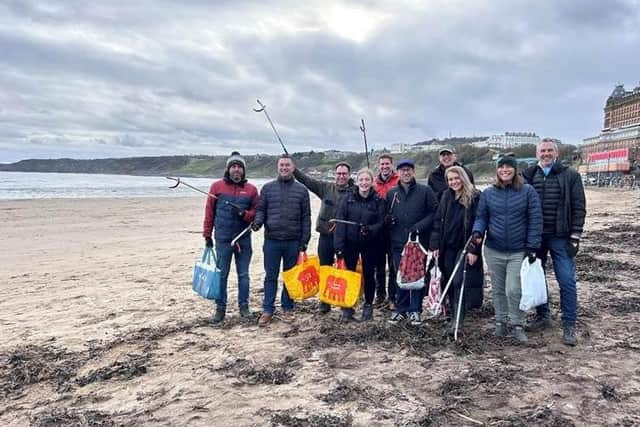Scarborough's Brunswick team helps to turn the tide on microplastics


The team of volunteers, led by retail and leisure agent, Savills and supported by Brunswick owner Scarborough Group International, planning consultant, Zerum, engineering consultant, Buro Happold and cost consultant, Burnley Wilson Fish scoured the coastline to remove any tiny microplastics and tangles of ocean debris, which can have a devastating effect on marine ecosystems.
According to the European Environment Agency, approximately 1.5 million tonnes of microplastics enter the oceans every year, which then accumulate in the bodies of marine and aquatic organisms leading to malnutrition, inflammation, reduced fertility and mortality.
Advertisement
Hide AdAdvertisement
Hide AdThe team collected a large amount of debris from the high tide line, including old fishing line, bottle tops, lollypop sticks, polystyrene and plastic pellets known as nurdles.
Stephen Henderson, Retail & Leisure Director at Savills, said: “Plastic pollution is threatening our amazing Yorkshire wildlife so anything we can do to help make a difference, no matter how small, is worth doing.”
Scarborough Group International acquired the Brunswick in August 2021 and obtained planning consent to repurpose the existing building into a high-quality, multi-screen cinema-led destination in March 2023.
The leading property regeneration and placemaking specialist is now in the process of concluding a legal agreement with the chosen cinema operator, as well as negotiating lettings to other occupiers and finalising detailed scheme engineering and design prior to commencing works on site.
Advertisement
Hide AdAdvertisement
Hide AdRachel Vickers, Senior Commercial Manager at Scarborough Group International, said: “At first glance, the beach looked spotlessly clean, it’s only when you delve underneath the seaweed along the high tide line that you realise quite how many microplastics are lurking there.
“On behalf of Scarborough Group and the Brunswick design team, I’d like to take this opportunity to thank Steve for taking the initiative to organise this event to support such an important cause.”
The beach clean, which was hosted by Yorkshire Wildlife Trust, is part of a region-wide initiative to give the Yorkshire coastline a thorough tidy up in order to protect marine life by preventing microplastics entering the sea.
For more information, visit www.ywt.org.uk/our-events/beach-cleans.